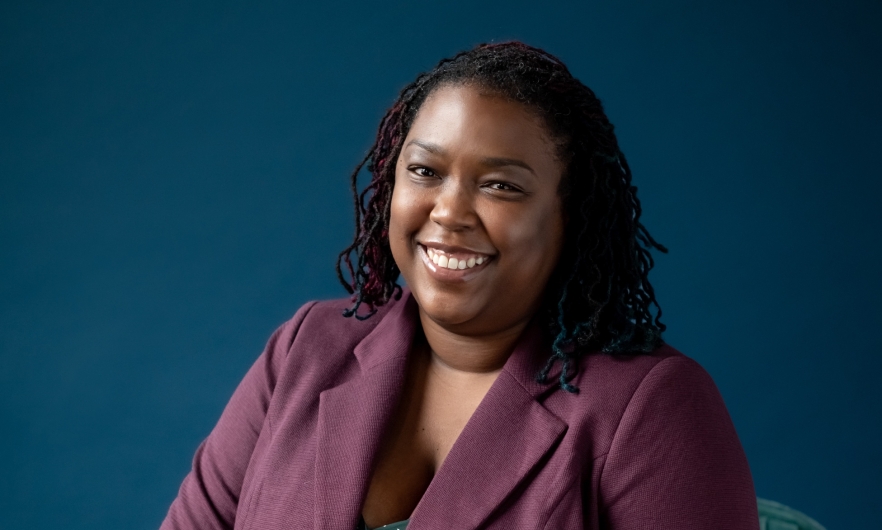Faculty Feature: Krystal Lee on Cultivating Anti-Oppressive Learning Communities

Meet Krystal Lee
Krystal Lee, EdD, reflects on leveraging her roots in education to advance social justice in public health training through her Cultivating Anti-Oppressive Learning Communities (CAOLC) Pilot Research Award.
- Role: Research associate
- Years with HBS: 2018 – present
- Fun fact: “One of the things that I like to do is upholster furniture. Even though a lot of my interests come from different spheres, they inform the way that I do things outside those particular spheres.”
“I would not say that I found my way to public health,” said Krystal Lee, EdD, research associate in the Department of Health, Behavior and Society at the Johns Hopkins Bloomberg School of Public Health. “I would say that, like many other things in my life, it happened to find me.”
Education is at the heart of Krystal Lee’s personal and professional journey. The daughter of two teachers, Lee was born and raised in Jamaica. She grew up in a house surrounded by books, in a family that encouraged her passion for reading and learning. When it came time for Lee to think about applying to college, it was never a question that she would pursue higher education—a reality, Lee noted, she was privileged to experience.
Still, she didn’t plan to study education. As an undergraduate, Lee majored in information systems at Morgan State University. But she quickly realized that the field wasn’t the right fit. After graduation, she decided to take a year off from school to work in housing and student affairs at her alma matter, Morgan State. During her gap year, Lee happened to visit the University of Delaware. She immediately fell in love with the campus and enrolled in the school’s master’s in public administration program, creating her own specialized concentration in student affairs. But Lee still wanted to further her education. Ultimately, she went on to earn her doctorate in higher education administration from the University of Florida. After completing her doctoral degree, Lee returned once again to Morgan State, where she served as the school’s director of academic enrichment.
Lee’s journey with HBS began in 2018, when she joined the Department as a research associate. Over the years, she has spearheaded a range of initiatives to enhance the Department’s academic mission and teaching capacity—from expanding HBS’s virtual course offerings to consulting with faculty to improve and refine their curricula. A member of the Bloomberg School’s Teaching Council, Lee has also partnered with faculty, staff, and students across the School ecosystem to strengthen its commitment to and resources for teaching. For the past three years, Lee has also co-taught a course called Foundations of University Teaching and Learning with fellow HBS faculty member, Tyler Derreth, PhD. The class, formed in response to feedback from the School’s graduates, equips students with the tools they need to teach successfully in a university setting.
In 2021, Lee and her team received a Pilot Grant from the School for their proposal: “Cultivating Anti-Oppressive Learning Communities for the Bloomberg School of Public Health.” The program, called CAOLC for short, teaches faculty about the principles of anti-oppression. It aims to identify barriers and facilitators to faculty incorporating anti-oppressive principles and, by extension, inclusion; diversity; anti-racism; and equity (IDARE) principles, into their teaching; research; and practice. CAOLC also seeks to evaluate how anti-oppressive course design and pedagogy influence student knowledge, with a goal of using the results to inform future teaching methods at the Bloomberg School.
“The idea is that if they are orienting towards anti-oppression and towards social justice, that it’ll influence the way that future public health practitioners, researchers, and teachers do their work,” said Lee.
CAOLC works to familiarize its participants with the concepts of anti-oppression and social justice. Anti-oppression, said Lee, is all about interrogating and challenging both structures and systems. A critical component of what of what Lee and her team teach is recognizing that personal behavior alone does not determine health. Social determinants of health, such as education, housing, and finances, shape people’s ability to live healthy lives. Though CAOLC works with public health faculty at the Bloomberg School, Lee emphasized that their work is inherently cross-disciplinary. It also requires vulnerability and humility for participants to move through the process of interrogating, questioning, challenging, and reorienting towards social justice.
“The work is close to my heart,” said Lee. “That comes from my own personal experiences, my own marginalized identities. I’m Black. I’m a woman. I’m an immigrant. I think we’re doing good and necessary and hard work.”
Although the work is rewarding, said Lee, it also comes with risks—especially those related to burnout and mental health. The CAOLC curriculum is deep, and it challenges participants, herself included, to reflect upon and think about their personal traumas and lived experiences—an emotionally taxing process that not all participants may innately appreciate or understand.
But a supportive network of CAOLC collaborators, including anushka aqil, PhD ’21; Graham Mooney, PhD; and Keilah Jacques, MSW, has helped to keep Lee motivated to continue the work. She also engages regularly in self-reflection, reminding herself that productivity and performance do not define her worth. Ultimately, she hopes the work will have meaningful and sustained impacts, not just on its current participants, but on future generations of public health students and leaders.
“People come from different backgrounds, in which different things are allowable,” said Lee. “That impacts how they are able to show up and learn in a classroom. It’s really about being humble, being open to learning from others, and being willing to hear another perspective and see it as valid, even though you have no experience with it.”
This interview has been edited and compressed. Views expressed are the subject's own.
